
I have passed the mansion at Berger Park countless times and been curious about it. I was also curious about the performances of Nothing Without a Company. Both of these came together on a recent evening. My companion and I were delighted to discover a little hidden treasure when we went to see the Chicago premiere of the award winning Not One Batu*, written by Co-Artistic Director Hannah Ii-Epstein, directed by Rachel Slavick, in association with cultural specialist Lanialoha Lee and Aloha Center Chicago. Not One Batu is the first full-length Hawaiian Pidgin-English play produced in Chicago, centered around the meth epidemic in Hawai’i and its impact on families for generations.
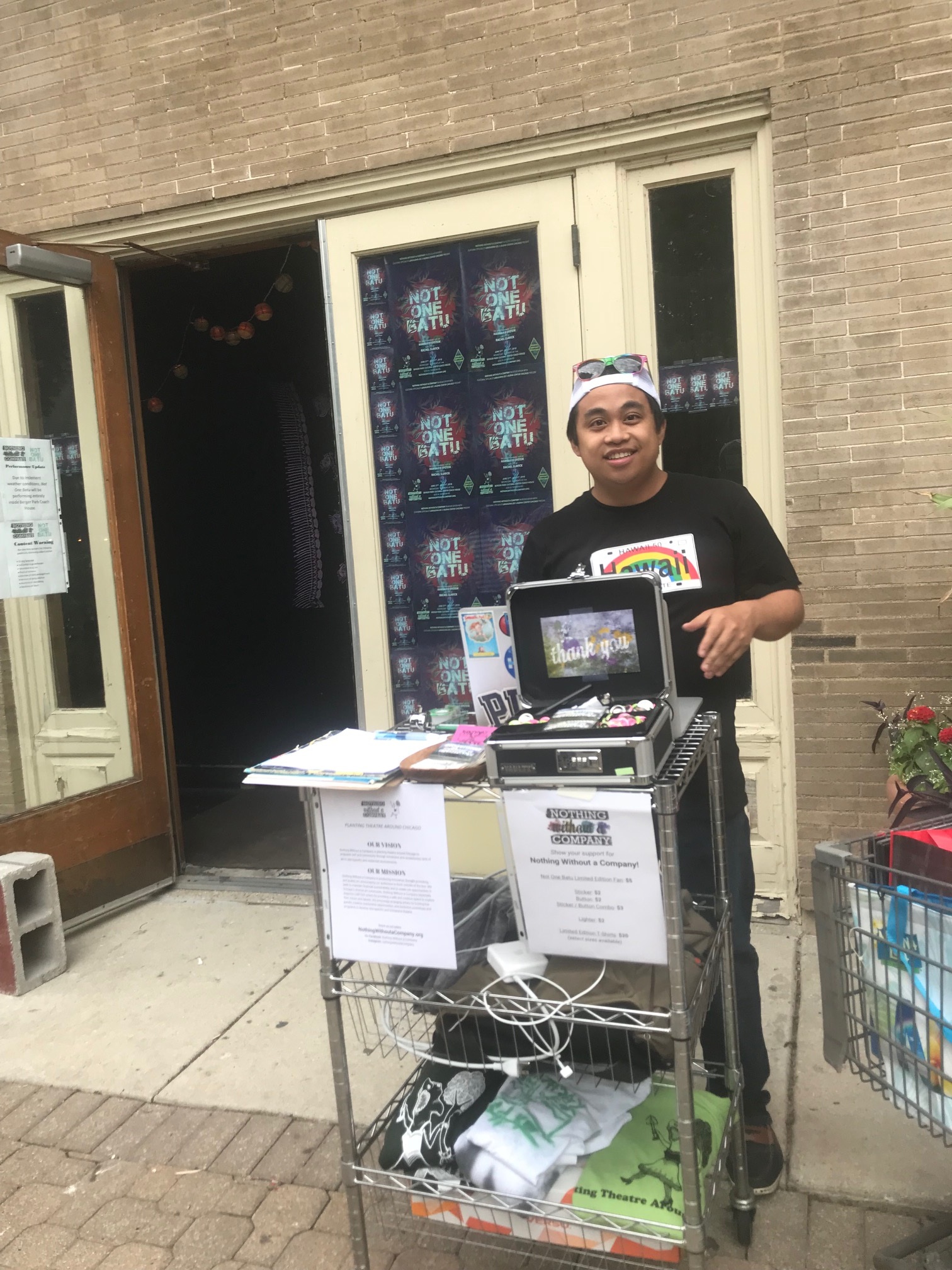
As we stepped inside the Berger Park Coach House, we received lei and were greeted warmly almost as though we were family. The group was treated to some singing, a story of what Hawaii was like before it was taken over by the U.S. Lelea’e “Buffy” Kahalepuna-Wong flown in from Hawai’i to reprise her role as Ma, did a Hula dance and her beautiful arms and hands told the story of this beautiful island. This was the Hawaii I experienced as a tourist.

After a while our chatty group was ushered outside- this being immersive theatre- we found ourselves seated and looking out at Lake Michigan. We were on the beach. I was glad that I had a wrap. And now, a different Hawai’i was revealed, a Hawai’i that I previously knew nothing about. And, I also learned that “batu” is meth.
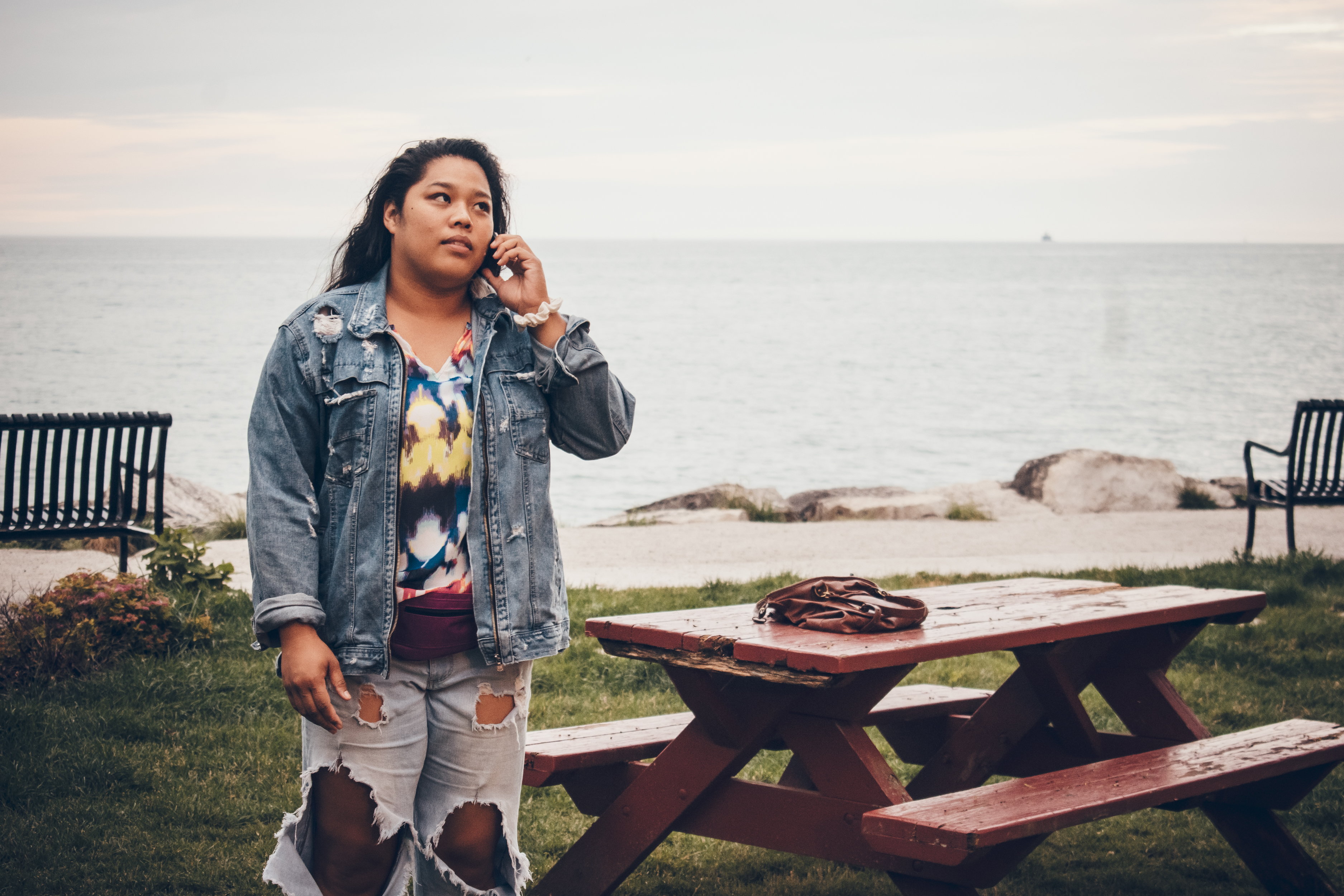
Honey Girl is introduced to us as an expert drug dealer, attempting to “stay clean” so she can keep her child. We are at Hale’iwa Beach Park one morning, watching as Honey Girl meets with customers and friends, rival dealers, and her addict mother. The staging is fascinating and very unusual. Fortunately, there is humor that breaks up the very serious and depressing reality of the impact of meth over generations. This play contains strong language, physical violence, and drug use. There is a fight scene that I can only say was impressive.
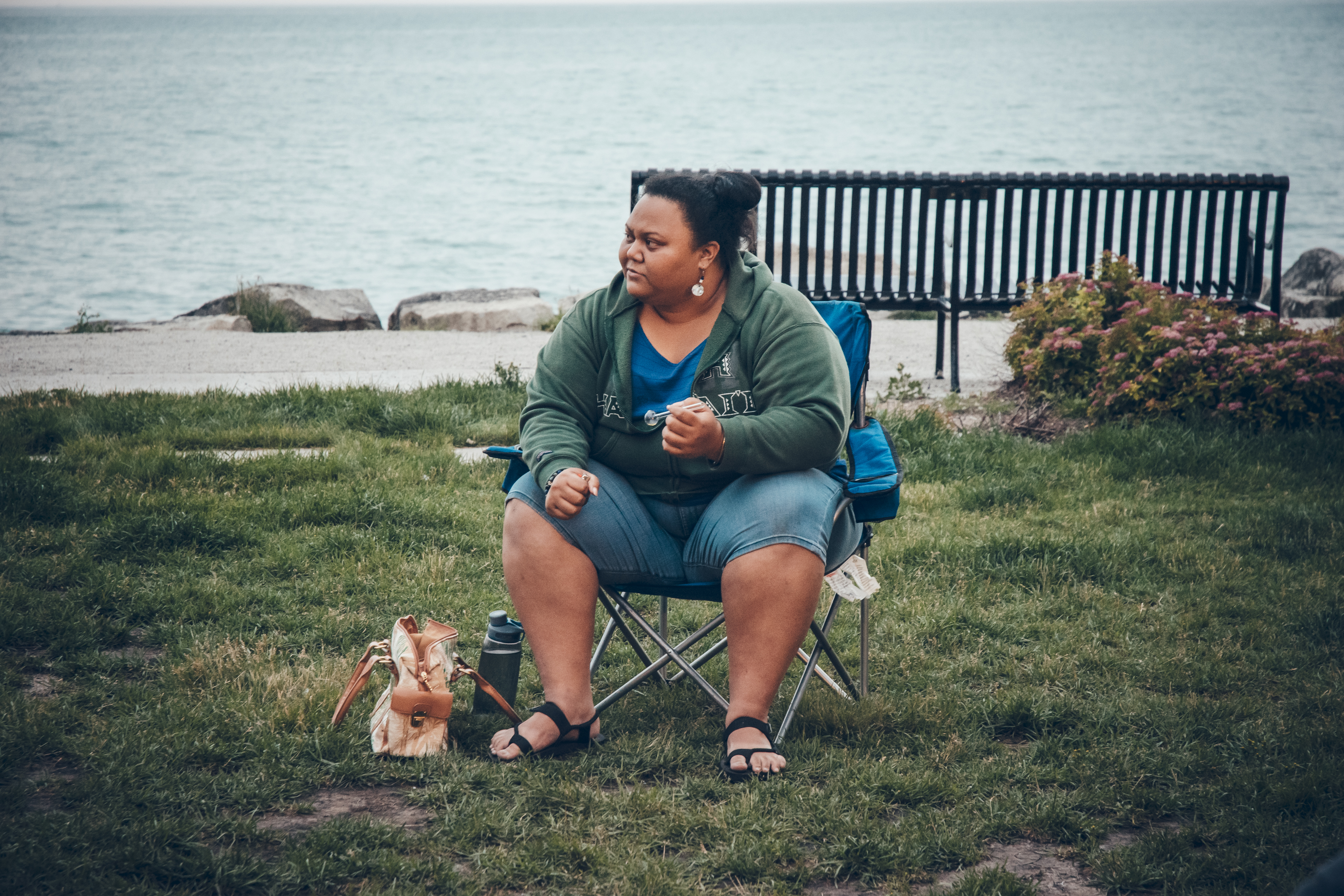
The cast features Lelea’e “Buffy” Kahalepuna-Wong, Marie Tredway, Scott Hanada, Bobby Wilhelmson, Jae K. Renfrow, Gloria Alvarez, Tony Rossi, Ian Voltaire Deanes and Heather Jencks.
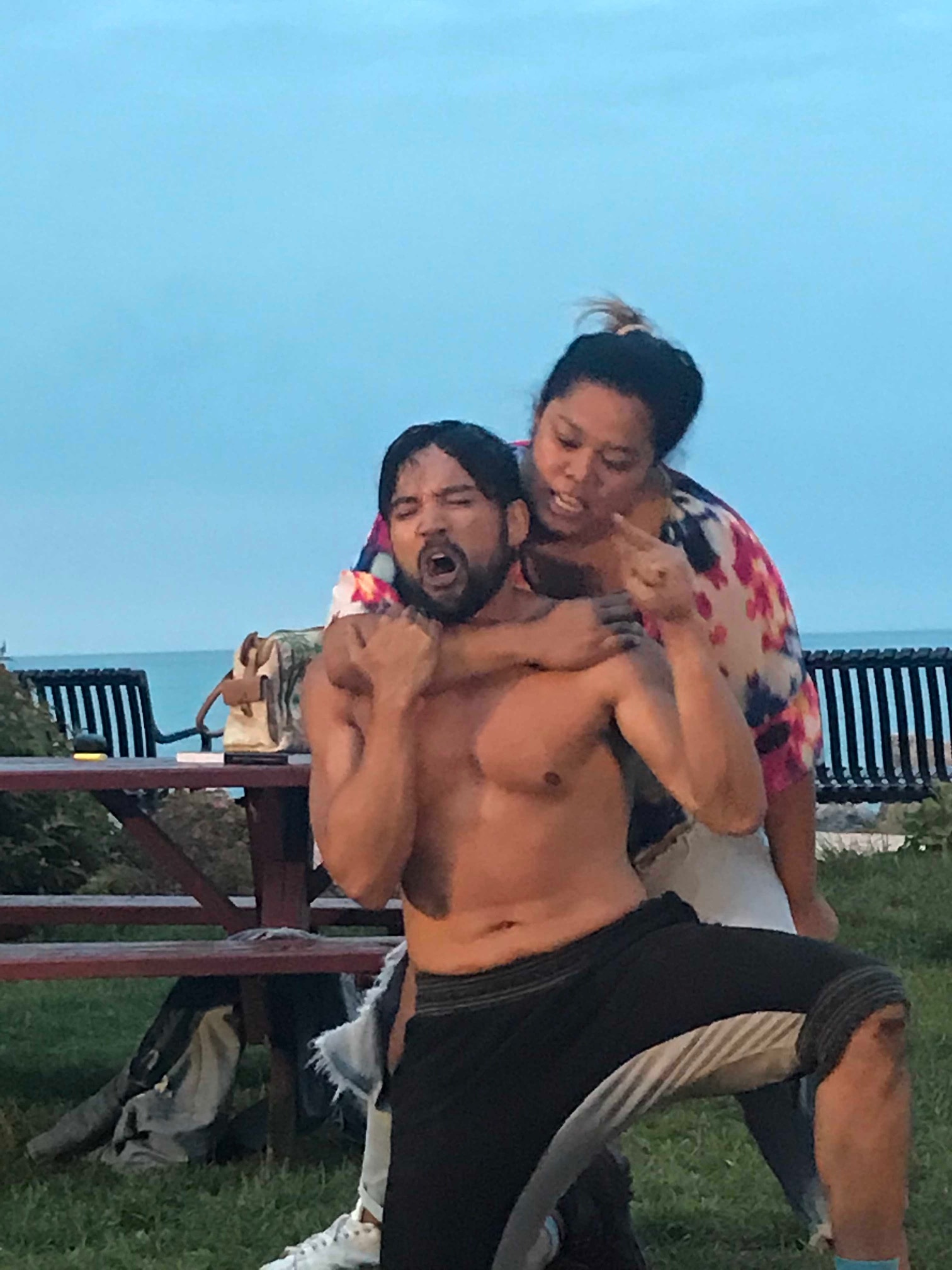
This performance was unique in my experience, revealing and impactful. The cast was strong, the story moving and the staging fascinating. This is an experience I highly recommend.
Berger Park Cultural Center Coach House, 6205 N. Sheridan Rd., Chicago IL. Tickets are available at NothingWithoutaCompany website.
Speaking Anna Rose Ii-Epstein, the Co-Artistic Director of Nothing Without a Company, she said that this was the only time a performance is likely to take place in this location because their performances take place in many locations. She was also quoted, “When I think about Hawaiian Pidgin English being heard by US Mainlanders for the first time, I wonder if it may feel similar to how Shakespeare’s plays sound. The words have a rhythmic tone, and even though everyone may not know the meaning of each word, the gist comes across thanks to the intention and the relationships in the play.”
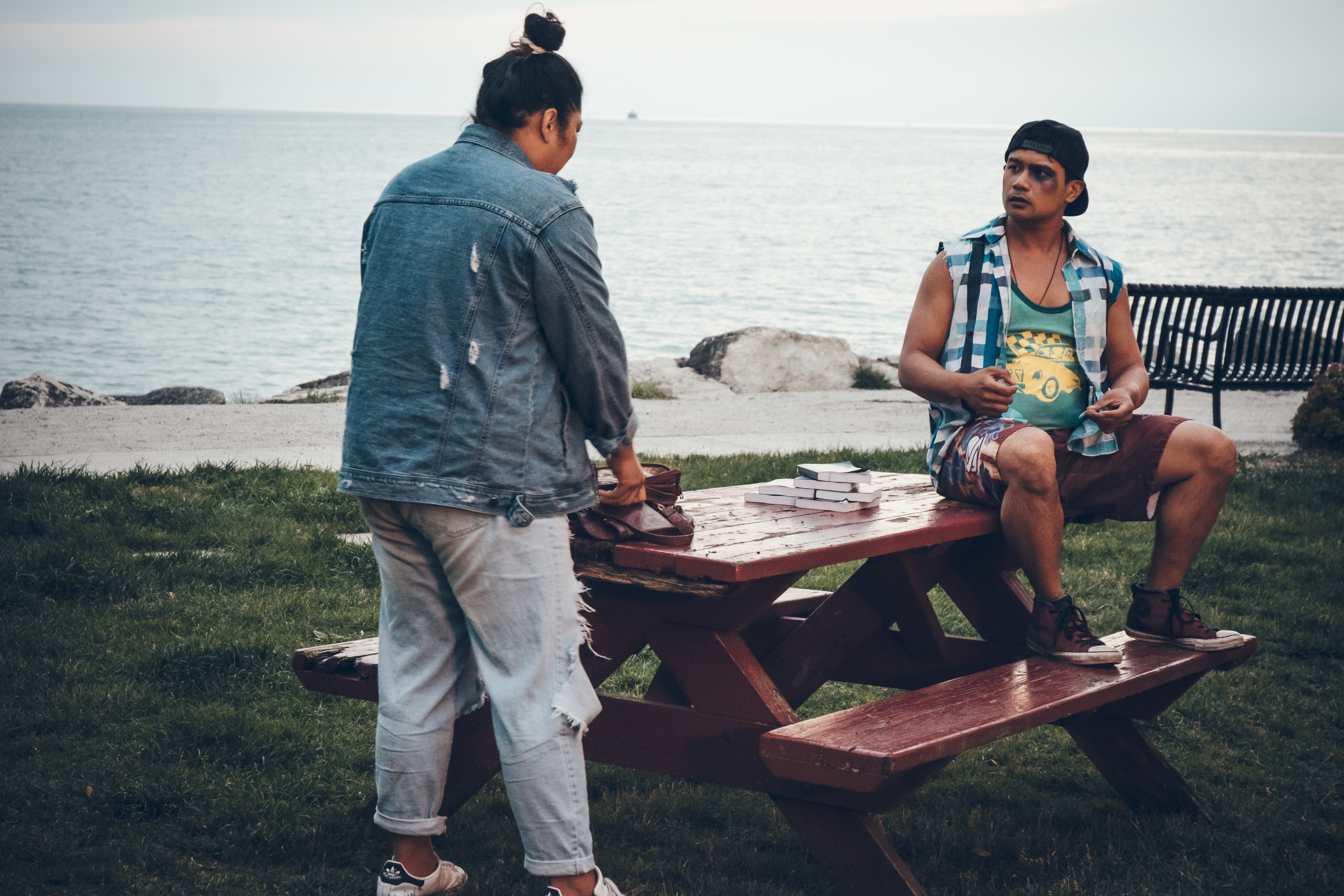
Co-Artistic Director Hannah Ii-Epstein has just graduated from Northwestern University and she generously answered some questions for me.
B.K. How did you happen to come to Chicago?
H. I. The reason I was up for moving out of Hawai’i was because I was newly sober from hard drugs like meth and coke, and I wanted to live in a place where I didn’t know anyone who did those types of drugs. I didn’t want to be tempted as I was in a mental and physical place where I could have relapsed. Chicago was chosen because my girlfriend at the time wanted to attend DePaul University and I was working and surfing everyday so I thought, “why not?” About four years after moving we broke up and I had choices ahead of me, should I move back to Hawai’i or to some other city or state or should I stay in Chicago? I had met Anna Rose and we fell in love so I decided to stay. At the time I met Anna Rose, I had also met the folks at Nothing Without a Company who introduced me to a new type of theatre. Ike Holter knew I wrote fiction and decided to mentor me in playwriting. Coming from a fiction background I was terrified of dialogue so my first two plays, Episodical 1.1 and Episodical 1.2 were both co-written with Ike.
B.K. What was your inspiration/motivation for developing “Nothing Without a Company”?
H.I. When I met Nothing Without a Company (NWaC) they had three shows under their belt. They were not a formed company, they were really good friends who were all involved in theatre and wanted to put on some experimental site-specific shows. The show I met them on was “Tabula/Rasa” which they were doing in Anna Rose’s apartment because they had all graduated undergrad and were moving out of the apartment. Some of them were moving on to other cities and others were moving to different neighborhoods in Chicago. I thought, “why are we spending our own money on shows? Why not incorporate?” So Evan Fillon, Laura Mahler, Ike Holter, Anna Rose Ii-Epstein, and myself decided to keep the name and the shark-lady as our mascot and become a non-profit theatre company. We wanted to continue to do theatre in a way no one else was in 2007/2008, no other company seemed to be doing site-specific theatre at least. So we got pro-bono lawyers to help with the paperwork, shared the responsibilities in running a company and producing shows, filmed trailers for our shows, partnered with Gill Park and other Chicago Park District spaces, and did some plays under the radar. As the company grew we lost some of our founders to other cities, Ike’s playwriting career blew up, we got insurance, paid our artists more, got some staff, new board members and so forth. It’s been quite a journey in 10 years of incorporation.

B.K. As a Northwestern University alum, I am curious about why you went on to obtain her degree and why NU?
H.I. I’m a late bloomer when it comes to academic institutions. Because of my past with sexual abuse and drug abuse, school was never something I considered. I had attended two different community colleges in Hawai’i and got a few credits from there. When I got to Chicago I was working in video stores and overall retail to keep myself busy but not stressed and to pay the bills. I met Anna Rose and NWaC, all these 20 somethings who just received their BA’s and BFA’s. It was very impressive to me. Anna Rose was the biggest driving force behind my education. With her help I decided to attend Harold Washington College, in my mid-20’s to take care of my core credits. I was just going for my A.A. in business. Anna Rose couldn’t stop talking about Columbia College Chicago, where she got her BFA. I checked out their fiction writing program and was hooked! I graduated from CCC in 2015. During my time there I had expressed interest in teaching at the college level someday and many of my professors including Carson Becker, Chris DeGuire, and Patrica McNair, told me that I should check out graduate schools, that they would write me letters of recommendation, that they believed I was a strong enough writer to continue my education. They knew I wasn’t about to move out of Chicago because I had my life here, Anna and I were married by that point, NWaC was going strong, we had roots planted in Chicago. Northwestern University’s MFA Writing for the Screen + Stage was suggested and I applied right away. This program was right up my alley, I wanted to start writing films and tv but didn’t know the structure. I wanted to hone my playwriting skills. They offered both and I was ecstatic. NU was the only school I applied to, it had the only program I wanted to attend, they had professors and guest professors who I looked up to, they had resources I wanted to take advantage of, part of the degree completion was to teach undergrads, to me it was a no brainer. I got in on my first try. I met many teachers who are now my advocates, I got the best cohorts this program has ever seen as they are all great writers and kind people, I was able to not only get by in school but to excel in my personal education. I will forever be a wildcat because this school changed my life, made me into a stronger writer, and a better collaborator.
One last question was to the director, Rachel Slavick
B.K. I am also curious about Rachel Slavick’s familiarity with Hawaii and the “meth” problem before working on the play.
R.S. I knew nothing about the Hawaiian Meth problem before beginning to work with Hannah on Not One Batu. Before that, I thought of meth as a primarily rural Midwestern and Southern problem. After sports and arts disappear from curriculums in small town America and the academic curriculum is dumbed down to appease constituencies that are horrified that their children might learn to think about anything other than God and country; hopelessness, boredom, despair, and rage pave the way for epidemic levels of substance abuse and violence.
The Hawaiian Meth problem is America’s Meth problem. The fact that smokable meth first arrived in Hawaii from China makes Hawaii the entrance point for the rest of the country. Now the pipeline flows, primarily (though not exclusively), from the mainland.
The Hawaiian Meth problem is nearly 40 years old. It’s original target, the Hawaiian people, are still the largest population suffering from this epidemic. Though the Hawaiian people have been able to reclaim much of their identity over time, there is still a sense of dislocation between that population and the primarily white, mainland institutions that seem to always hold the reins of power, be it political or economic. Disenfranchised populations will always be at higher risk for all public health crises.
This play has been extended to July 28th, 2018
Photos: Matthew Gregory Hollis, unless otherwise noted.

Be the first to comment